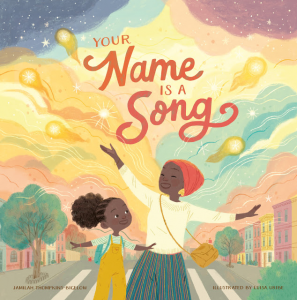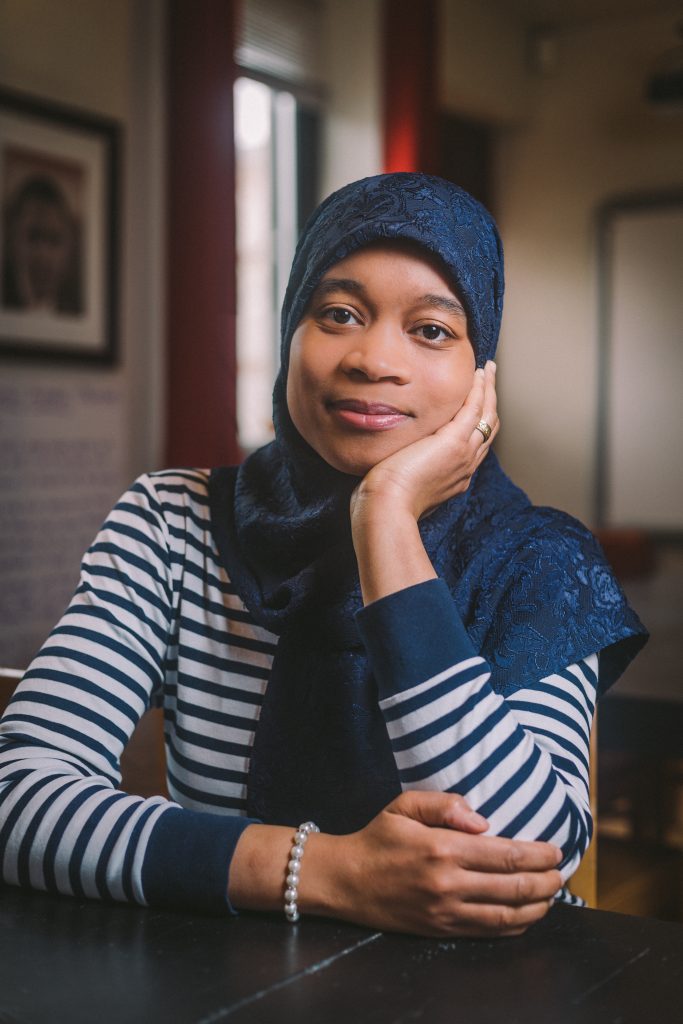 Happy Publication Day to author Jamilah Thompkins-Bigelow! Her latest picture book, Your Name is a Song, releases today.
Happy Publication Day to author Jamilah Thompkins-Bigelow! Her latest picture book, Your Name is a Song, releases today.
This phenomenal picture book (illustrated by Luisa Uribe and published by Innovation Press) is the story of a young girl who doesn’t want to go back to school after the first day because no one is able pronounce her name…and of a mother who encourages her daughter to reframe and confront the situation in an empowering way.
I had the opportunity to read an ARC of Your Name is a Song and before I was even half-way through, I knew this was going to be one of the star releases of the year. I reached out to Jamilah to find out the story behind YNIAS. Here’s what she told me:
* * *
JT-B: I was motivated by the kids I’ve worked with throughout the years who have beautiful names but might not recognize those names as being so because of the ways their names are mispronounced or mocked. I’m hoping they see themselves in the main character (whose name isn’t revealed until the end) and go through the same empowering journey. I thought about how they probably needed an affirming voice telling another story about their names. Mispronouncing or mocking someone’s name can be a way of belittling a child even if unintentionally, and I wanted those kids to come away from reading this book feeling just as proud as the main character.
JT-B: A few times. I had a teacher call me Jamal all school year no matter how many times I corrected her. A boy used to call me Ja-Miller Lite for kicks. I think my twin brother got it the worst. His name is Bilal (Bee-Laal), which is the name of a very important historic Muslim figure, but kids would always call him “Blah” and snicker and teachers almost never tried to get it right.
JT-B: Love, love, love! I loved the art she produced from the start because I could see how much she loved these characters in the little details she included and the sunny color palette.
I definitely had a voice in choosing the illustrator and we (my editor, agent, and I) went through a number of portfolios before I was introduced to Luisa’s work. I saw her first sketches for the book and I knew she was right for it. Her work is visually stunning, period, but what’s more important is from the start, she seemed incredibly attached to this project. She seemed to love these characters and their story and it shows in her art.
JT-B: This question is impossible to answer because I probably have several favorites. Luisa did an amazing job! One I adore that hasn’t been shared as much in previews is a tender moment when Momma has helped our main character feel proud of her name and leaves her at the school yard gate. This is this girl’s time to be strong on her own and Momma is giving her her blessing and letting this girl know that she can definitely handle this situation.
JT-B: I’m hoping that this is an empowering and loving book for readers whose names haven’t always been so valued. I want these readers to feel that Momma has got their backs too. I want them to feel like singing their names by the end of it. And I’m hoping that this book also creates empathy, especially from people who have names from the dominant culture and may never have thought about how the way they treat the names of others can be demeaning.
JT-B: For the same reasons I just stated: because it can empower and create empathy. This is especially important in US classrooms that are taught predominantly by white teachers while the children in those classrooms are increasingly populated by Black children and children of color. I feel first that teachers themselves may want to read and sit with Your Name is a Song and reflect on how they have treated students with names they found hard to pronounce in the past. Have they made jokes about certain kinds of names? I think they need to make a commitment to respecting and saying the names of their new students correctly, and they need to state this explicitly to students from the very first day of school. And then, they need to do the work to get their names right and to not embarrass them. Don’t make your first interaction with a student be you loudly taking attendance if that means loudly saying their name wrong. I say this as a former classroom teacher; there are multiple ways to take attendance without doing the embarrassing first-day-of-school roll call. I think reading this book aloud could be used to underscore that commitment and to also have discussions about how to ensure everyone feels like their identities are validated in the classroom. I also think this is a book that could launch a school year practice of celebrating and learning about identity and diversity.
JT-B: I’d say: READ MY BOOK! Run out and buy it NOW! I’m joking, but then again… I’m not. I wrote this book specifically for the person you’re describing. In talking to adults who were able to review the book in advance, I’ve heard that this book was a healing book for them. This word “healing” has been used multiple times and I cherish and am humbled by that word. I’ve read bloggers write again and again “my name is a song” in their reviews after reading this book because they needed to say those words. Their younger selves needed those words. So, I say to that person, “Your name is a song.” Who you are is a song. Your identity is beautiful, it is valuable, and you didn’t deserve to have your identity–any aspect of it–treated that way.

Your Name is a Song is available wherever books are sold. Again, Happy Book Birthday, Jamilah!

Great interview!
Love this! As an educator, I’m looking forward to having this book as a resource. I am also a facilitator of an Affinity Group for Students of Color in 3rd and 4th grade.
Such a powerful book. I admit I also had difficulty saying Children’s names too. I struggle but I remember trying my best all the time. I apologize to all the students who had been in my class and I struggled to pronounce your names. A great book to help us reflect as teachers. Thank you for this book.